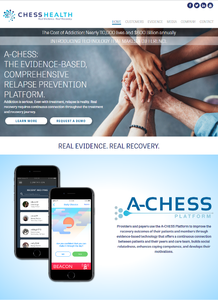Alcohol Comprehensive Health Enhancement Support System (ACHESS)

- Description:
A-CHESS is a relapse-prevention smartphone application designed to provide continued support to individuals in recovery from alcohol dependence recently discharged from residential care. It is part of a larger suite of evidence-based health management systems known as CHESS. The app is based on Self-determination Theory which focuses on autonomy, personal competence and relatedness to others to enhance motivation and well-being as well as cognitive behavioral components focusing on identifying and preventing high-risk relapse situations. Content includes both informational and interactive components. One feature of the app is a personal monitoring system which uses GPS-enabled location tracking to alert users when they approach historically high-risk locations such as bars or pubs that they have frequented before to prevent relapse. There are many other features: information services provided through electronic libraries and an 'ask the expert' feature, social support though discussion forums and private messaging and a panic button feature, which, if pressed, will contact preapproved friends and family through text-message when the user is in need of support. Daily check-ins and weekly surveys on alcohol use, craving and withdrawal symptoms help assess relapse risk and targeted feedback is provided. Audio and text-reminders are regularly sent on personal milestones achieved and reasons to quit in order to encourage sustained recovery whereas audio-guided relaxation exercises help manage stress.
- Service URL:
- https://www.chess.health/
- Agency Responsible:
- CHESS Health.
- Mobile Platforms:
- Apple and Android.
Details
- Format:
- Smartphone Application.
- Intervention Type:
- Psychological – CBT.
- Course Structure:
- No Set Course.
- Course Length:
- Other. No set length
- Support Option:
- Automated only.
Target Audience
- Primary Category:
- Alcohol.
- Target Audience:
- Adult.
- Language:
- English.
Access
- Mobile platforms:
- Fee:
- Free.
- Access:
- Closed: Email administrator. Provider code required for access
- Contact Details:
support@chess.health
Research evidence
- Research Trials:
- 3
- Research RCTs:
- 1
- Outcome Summary:
One randomized controlled trial (RCT) has tested the efficacy of the A-CHESS program in supporting alcohol recovery in a sample of 349 alcohol-depentent patients from 3 residential programs in the US. The 2 arm RCT compared the intervention group, which received treatment as usual (TAU) along with A-CHESS, to a control group which received TAU alone. For the 8-month intervention period and 4-month follow-up, patients in the intervention group reported significantly fewer risky drinking days when compared with the control group with a mean of 1.39 vs 2.75 days (mean difference 1.37; 95% CI 0.46 - 2.27; p = 0.003). Risky drinking days were defined as the number of days where the patient's drinking exceeded 4 standard drinks (a drink containing 14g of pure alcohol) for men and 3 for women within a 2-hour period. A secondary analysis of this sample found that the intervention was associated with increased odds of seeking outpatient addiction treatment across follow-ups at 4, 8 and 12 months but not seeking mutual help through support groups, for example, Alcoholics Anonymous. As such, A-CHESS appeared to reduce the number of risky drinking days across follow-ups by 11% through outpatient addiction treatment.
One further pilot trial tested the feasibility and potential effectiveness of the program in providing recovery support to alcoholics. Preliminary evidence shows that adolescents engaging with at least two recovery activities using the A-CHESS had better substance use outcomes than those who did not access the program.
- Recommended rating, reviewer 1:

- Recommended rating, reviewer 2:

Read more about Beacon's Smiley Rating System.
Research paper citations
Gustafson, D. H., McTavish, F. M., Chih, M. Y., Atwood, A. K., Johnson, R. A., Boyle, M. G., . . . Shah, D. (2014). A smartphone application to support recovery from alcoholism: a randomized clinical trial. JAMA Psychiatry, 71(5), 566-572. doi: 10.1001/jamapsychiatry.2013.4642
Glass, J. E., McKay, J. R., Gustafson, D. H., Kornfield, R., Rathouz, P. J., McTavish, F. M., . . . Shah, D. (2017). Treatment seeking as a mechanism of change in a randomized controlled trial of a mobile health intervention to support recovery from alcohol use disorders. J Subst Abuse Treat, 77, 57-66. doi: 10.1016/j.jsat.2017.03.011
Dennis, M. L., Scott, C. K., Funk, R. R., & Nicholson, L. (2015). A Pilot Study to Examine the Feasibility and Potential Effectiveness of Using Smartphones to Provide Recovery Support for Adolescents. Substance abuse, 36(4), 486-492. doi: 10.1080/08897077.2014.97032
User ratings
User ratings and comments are moderated in order to assure the quality of the submissions. It might take a week for your rating to show up.
Your rating
Login to rate this service.
Other user ratings
No ratings for this service yet.
Last Updated: June 14th 2018

 Home
Home
 Categories
Categories Alcohol
Alcohol